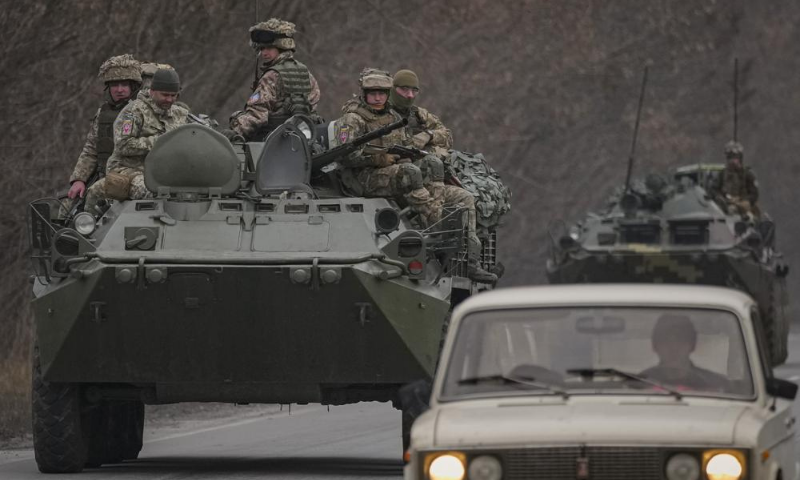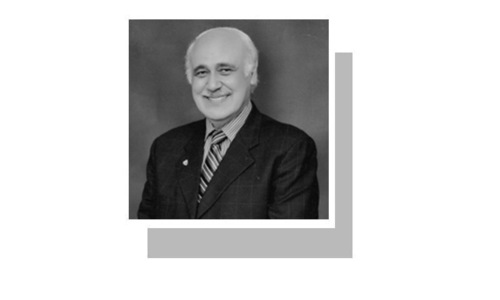KYIV: Russia launched a full-scale invasion of Ukraine on Thursday, unleashing airstrikes on cities and military bases and sending troops and tanks from multiple directions in a move that could rewrite the world’s geopolitical landscape. Ukraine’s government pleaded for help as civilians piled into trains and cars to flee.
The UN refugee agency said around 100,000 people had fled their homes in Ukraine and several thousand more had left the country since neighbouring Russia invaded early Thursday.
Invading Russian forces pressed deep into Ukraine as violence spiralled, claiming dozens of lives and raising the prospect Moscow will march on Kyiv as the West imposed punishing sanctions in response.
In a day of intense fighting, Russian missiles and shelling rained down on Ukrainian cities, forcing civilians to seek shelter on metro systems, with others displaced by deadly airstrikes.
Across Ukraine, at least 68 people were killed, including both soldiers and civilians, according to an AFP tally from Ukrainian official sources.
Airstrikes, shelling kill dozens; civilians pile into trains and cars to flee
Moscow’s forces seized a key strategic airbase near Kyiv as well as the scene of the Chernobyl nuclear disaster, a vast area still heavily contaminated with radioactive material.
Russia has “eliminated” Ukraine’s air defences and is looking to mass overwhelming forces around the capital Kyiv, a senior Western intelligence officer said in Brussels.
A Russian Antonov An-26 transport plane carrying military equipment crashed in Russia’s southern Voronezh region near Ukraine, killing all crew members on board, the defence ministry said.
Witnesses told AFP that Russian paratroopers wrested control of the Gostomel airfield after swooping in with helicopters and jets from the direction of Belarus. The airfield could now provide a strategic staging post for Russian forces to ferry in troops who could then launch an assault on government buildings and the presidency in Kyiv.
Western intelligence has said that Russia is seeking to mass “overwhelming force” around the Ukrainian capital and that Moscow has established “complete air superiority” over Ukraine.
Elsewhere, Russian ground forces moved into Ukraine from the north, south and east, forcing many Ukrainians to flee their homes as the sound of bombing reverberated. Moscow’s defence ministry said its forces had “successfully completed” their objectives for the day, earlier claiming to have destroyed over 70 Ukrainian military targets, including 11 airfields.
Fall of Chernobyl
Ukrainian President Volodymyr Zelensky said there was now a “new iron curtain” between Russia and the rest of the world, like in the Cold War.
US President Joe Biden announced export controls against Russia to cut off more than half of the country’s high-tech imports, alongside sanctions on Russian elites he called “corrupt billionaires”, and banks.
He earlier said the G7 group of wealthy nations had agreed to impose “devastating” economic sanctions. Biden once again said additional US forces were not heading to eastern Europe to fight in Ukraine, but would defend “every inch” of Nato territory.
Weeks of diplomacy failed to deter Putin, who massed over 150,000 troops on Ukraine’s borders in what the West said was Europe’s biggest military build-up since World War II.
Air raid sirens sounded over Kyiv at daybreak after the city’s main airport was hit in the first bombing of the city since World War II.
The city declared an overnight curfew but said underground stations would remain open throughout to serve as bomb shelters.
Zelensky called the attack on Chernobyl “a declaration of war on all of Europe” while 18 people were killed at a military base near the Black Sea port of Odessa in the deadliest single strike reported by Kyiv.
Ukraine also said a military plane with 14 people on board crashed south of Kyiv and that officials were determining how many people died, while a transport plane crashed in Russia killing the crew.
Ukrainian forces said they had killed “around 50 Russian occupiers” while repulsing an attack on a town on the frontline with Moscow-backed rebels, which could not immediately be confirmed by AFP.
In the Ukrainian village of Starognativka near the frontline where separatists have faced off against Kyiv’s forces, official Vladimir Vesyelkin said missiles had rained down since the morning and power was out.
“They are trying to wipe the village off the face of the earth,” he said.
Ukraine said Russian tanks and heavy armour crossed the border in several northern regions, in the east as well as from the Kremlin-annexed peninsula of Crimea in the south.
The fighting spooked global financial markets, with stocks plunging and oil prices soaring past $100.
In a televised address, Putin justified the assault as a defence of the self-proclaimed Donetsk and Lugansk republics in eastern Ukraine.
Nato said it had activated “defence plans” for allied countries, but alliance chief Jens Stoltenberg said there were no intentions to send Nato forces into Ukraine.
Russia has long demanded that Ukraine be forbidden from ever joining Nato and that US troops pull out from Eastern Europe.
In the Baltics, Lithuania declared a national emergency and Latvia banned three Russian TV channels that were broadcasting in the country, saying they posted a “threat to national security”.
Demonstrators took to the streets of European capitals to condemn Russia but a small anti-war protest in Moscow was quickly shut down by police and monitors said over 1,400 people were detained across the country.
The first Ukraine refugees have begun to trickle into Hungary and Romania.
President Vladimir Putin ignored global condemnation and cascading new sanctions as he unleashed the largest ground war in Europe in decades, and chillingly referred to his country’s nuclear arsenal. He threatened “any country trying to interfere with consequences you have never seen”.
Ukrainian officials said their forces were battling Russians on a multiple fronts and had lost control of the decommissioned Chernobyl nuclear power plant, scene of the world’s worst nuclear disaster.
Russia has embarked on a path of evil, but Ukraine is defending itself and won’t give up its freedom, Ukrainian President Volodymyr Zelenskyy tweeted.
In Washington, US President Joe Biden announced new sanctions against Russia, saying Putin chose this war and that his country would bear the consequences of his action.
The sanctions will target Russian banks, oligarchs, state-controlled companies and high-tech sectors, he said, adding they were designed not to disrupt global energy markets. Russian oil and natural gas exports are vital energy sources for Europe.
Zelenskyy urged the US and West to go further and cut the Russians from the SWIFT system, a key financial network that connects thousands of banks around the world. The White House has been reluctant to immediately cut Russia from SWIFT, worried it could cause enormous economic problems in Europe and elsewhere in the West.
Zelenskyy, who earlier cut diplomatic ties with Moscow and declared martial law, described Russian forces advancing on a series fronts, including a difficult situation developing in Kharkiv, Ukraine’s second-largest city, just over 20km away from the eastern border with Russia, and Russian troops slowly advancing from the north on the city of Chernihiv. He said a Russian airborne unit at an airport just outside Kyiv, the capital, was being destroyed.
He appealed to global leaders, saying that if “you don’t help us now, if you fail to offer a powerful assistance to Ukraine, tomorrow the war will knock on your door”.
The conflict was already shaking global financial markets. Stocks plunged and oil prices soared amid concerns that heating bills and food prices would skyrocket.
Condemnation rained down not only from the US and Europe, but from South Korea, Australia and beyond and many governments readied new sanctions. Even friendly leaders like Hungary's Viktor Orban sought to distance themselves from Putin.
Published in Dawn, February 25th, 2022













































